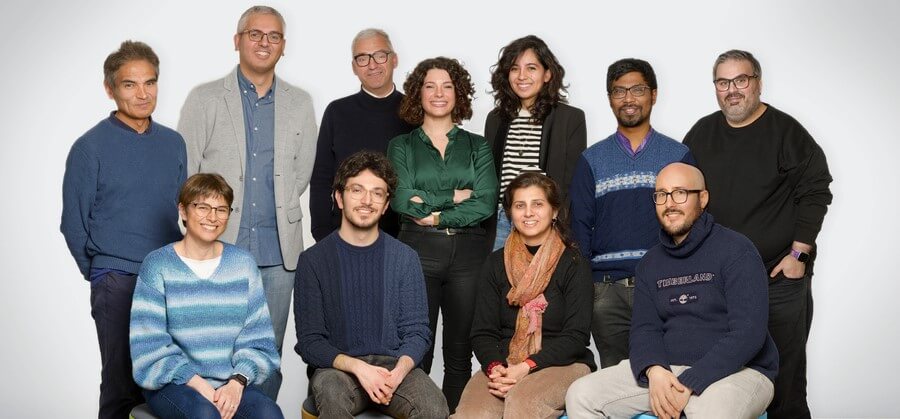
The biotechnological company Zymvol raises €1.3M and joins the Barcelona Science Park
The biotechnological company Zymvol has just opened a laboratory in the Barcelona Science Park, after closing a first seed round of €1.3M, led by the European venture Elaia Partners. With this new capital injection, the company, specializing in computational engineering for enzyme discovery and optimization, plans to boost its current portfolio and catalyze widespread use in industry to promote a new generation of products leading the transition towards a more sustainable future.
Zymvol is a leading global player in the computational enzyme discovery and design field. Since its foundation in 2017, it has invested more than €4 million in R&D and has participated in more than 80 highly innovative and competitive projects worldwide, collaborating with important companies in the pharmaceutical and chemical sector, and large suppliers of the food and nutrition industry such as Archer Daniels Midland (ADM).
Now, with a team of more than 20 and offices both in Barcelona and Boston, the company is ready to take the next steps: from scaling the business, increasing its workforce and inaugurating a new lab space at the Barcelona Science Park, to maximizing the potential of its own portfolio of enzymes, with applications in areas such as sustainable material production and degradation, as well as creating better ingredients for food and cosmetics.
“Computational enzyme design is an industry changer with a vast array of applications in sectors like pharmaceutical, chemical and other industries. With Zymvol, we are proud to back experts in enzyme engineering that can deliver across multiple sectors which face challenges such as: accelerating drug production, recycling polymers or need to consume drastically less water and energy”, states Sébastien Lefebvre, partner at Elaia.
Elaia Partners is a European top-tier VC firm with a strong tech DNA, which back tech disruptors with global ambition from early stage to growth development. For the past 20 years, has been an active partner in over 100 startups including success stories such as Criteo (Nasdaq), Orchestra Networks (acquired by Tibco), Volterra (acquired by F5), Mirakl (valued $3.5B in Series E) and Shift Technology (valued $1B+ in Series D).
“We chose to work with Elaia for their expertise in the digital and life sciences and their well-established track record supporting deep tech entrepreneurs ”, states Maria Fátima Lucas, cofounder and CEO of Zymvol, who was awarded in 2020 with the EU Prize for Women Innovators.

Maria Fátima Lucas, CEO & cofounder of Zymvol.
A Software that mimics Nature
Enzymes are biocatalysts, proteins naturally found in living organisms responsible for “catalyzing” (accelerating) millions of chemical reactions. For decades, various industries have used them to improve the properties of their products (e.g. detergents with better stain-removal power, lactose-free milk, etc), as well as to substitute polluting, traditional catalysts.
Despite an enzyme’s ability to be applied in industrial chemical processes, it must be first engineered to withstand the factory environment, as significant changes in pressure and temperature can render them useless.
Normally, the process of engineering an enzyme would take months -even years- of lab work, which makes it a rather expensive process.
But what really sets Zymvol apart is its computational technology, which compared with traditional, lab-only methods, is capable of producing better results in half the time – and at a fraction of the cost. The secret lies in its proprietary software, which uses computer simulations to mimic the conditions of the protein in nature, produce millions of in silico enzyme variants and test in the lab only what matters.
Furthermore, the company is also able to discover enzymes for a target reaction without prior knowledge. This means opening the door to potential projects that know which target chemical reaction they want to achieve, but don’t know there might be an enzyme for it.
Enzymes for a greener and more sustainable future
If there’s one thing that enzymes are known for is their environmental friendliness. Applying a biocatalyst to an industrial process can eliminate -or decrease significantly- the need for toxic chemicals. And since it can operate at mild conditions, they can work at lower temperatures and pressure, which leads to energy savings. “It’s no wonder that with the increasing need to maintain competitiveness and comply with sustainability standards, more companies are looking for the right enzyme to help them produce better products”, states Maria Fátima.
In fact, this trend doesn’t seem to slow down any time soon. According to Grand View Research, the global enzyme market was worth $11.47 billion in 2021 and is estimated to grow at 6.5% (CAGR) from 2022 to 2030.
“Biocatalysts have proven to be an effective solution in reducing emissions and harmful chemicals in industrial production, but it is still under-used due to the complexity of its implementation”, states Maria Fátima. “With Zymvol, we strive to make enzymes accessible to everyone, so green chemistry becomes the new norm”.




